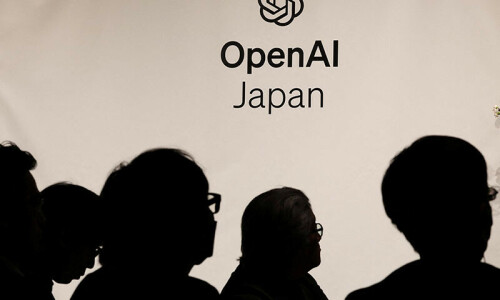
“Eight months have passed since the local body elections held but we have yet to get benefit from the newly-introduced local government system in the province,” Ghulam Gillani, an elderly man, tells friends at a Mansehra market.
A group of men of different thoughts and political affiliations sit in the market daily to discuss political and social events and issues.
Mr Gillani said he had heard much about the benefits of the system like it would change the fate of people at grassroots level and the crime incidence would come down to almost zero, but nothing like that had taken place so far and even, the government’s own employees hadn’t been paid salary for six months.
Mohammad Shafi, a former forester, interrupted Mr Gillani, saying the people should wait and see for ‘some more magic of that system’ to appear as the opposition parties in the district council are at odds over the budget.
He said he was not bothered to hear versions of both sides as it all seemed foolish.
Fareed Shah, another participant, joined the discussion saying the system was good if the local government’s representatives worked sincerely and didn’t involve themselves in corruption.
“This ongoing LG system is combination of good and bad people and if the good people overpower the bad people, the system will flourish to the benefit of the people otherwise they will not benefit from the system,” he said.
Mushtaq Khan, the convener of Tehreek-i-Sooba Hazara, jumped into the discussion and said under the current so-called democratic system based on ‘family inherited limited companies’ like Bhuttos, Sharifs, Bachas and so-called maulvis, no local government mechanism couldn’t succeed in the country as the powers won’t be devolved to the people at the grassroots level in letter and spirit.
“Do you think that Shahbaz Sharif in Punjab, Zardari in Sindh and Imran Khan in Khyber Pakhtunkhwa will transfer powers to local bodies? Never will this happen as they won’t like to share their authority with the common man. That’s why the local government systems don’t deliver the goods here,” he said.
Mr Mushtaq said his movement campaigned for the creation of more federating units in the country as smaller provinces would help manage the country in a better way.
He said both ruling and opposition parties in district government and their allies were in a tug-of-war for personal benefits instead for the benefits of the people.
He said PTI had secured the highest number of district council seats in May 30, 2015, elections but the PML-N robbed it of the people’s mandate by roping in four of its (PTI) councilors and thus, creating political turmoil in the district to the misery of the people.
“Political parties should accept the mandate of each other so that the benefits of the local body system could be transferred to the common man,” he said.
This discussion is not limited to a traditional sitting and instead, everybody from employees to traders to lawyers to journalists, are seriously discussing the local government system introduced after almost 10 years of its suspension in the province.
Mansehra had seen an overwhelming enthusiasm in the people during the May 30 LG elections for district, tehsil and village and neighbourhood councils. However, the people insist their expectations have yet to be fulfilled by the local body system.
As many as 4,699 candidates, including 347 women, took part in the polls.
Though the current LG system introduced in the province is totally different the one prevailing in other provinces, most of elected councillors were part of the previous LG system given by former military ruler, Pervez Musharraf.
The four PTI councillors, who paved the way for installing the PML-N government in the district by crossing the floor, didn’t turn out to be of much help to the treasury in the budget session of the council.
Since the district government’s failure to get the budget approved by the council lately and the opposition parties led by the PTI filing a no confidence motion against the district nazim and his deputy, uncertainty has been prevailing in the district about the things related to governance.
Mansehra district nazim Sardar Said Ghulam, who belongs to the PML-N, declares the LG system ‘a wax nose’, which can be turned to wherever the provincial government wants to protect its interests.
He said the PTI government in the province was conspiring to fail the LG government as the people contested the local body elections under the Local Government Act 2013 but the government changed the law lately to shift the entire powers of the local governments to bureaucracy.
“When the PTI government failed to install PTI governments in most districts, it amended the LG Act 2013 to declare the nazims failing to get the budget approved from the respective district councils will have to seek a fresh vote of confidence. This is an attempt to destabilise the current local body system,” he said.
The nazim said under the LG Act 2013, the opposition needed two thirds votes in the council to expel a nazim through a no confidence motion.
He admitted he didn’t deliver as yet but blamed it to the transfer of all his powers to deputy commissioner under the recently issued rules of businesses.
“Now, the district nazims are only members of the respective district development advisory committees. The deputy commissioners will lead the committees.
“If all these important powers are to be exercised by deputy commissioners, why the LG system is restored in the province,” he said.
Mr Sardar Said Ghulam said nazims supposed to lead district governments couldn’t post or transfer officers and employees of the devolved departments and that under such circumstances, no one would obey their orders.
Mansehra tehsil nazim Khurram Khan too insisted the PTI government was opposed to giving powers to the district governments.
“The schemes suggested by councillors are not being approved locally. They’re dispatched to the provincial government for approval, which is contrary to the spirit of the LG system,” he said.
The tehsil nazim said he didn’t have the authority even to write the annual confidential reports of the tehsil municipal administration employees working directly under him.
He asked how he could live up to the people’s expectations under such circumstances.
“I admit I haven’t delivered as much as I thought about before becoming part of this system, but I am not responsible for it as all of my powers given under the LG Act 2013 are transferred to the assistant commissioners through the recent amendments to it,” he said.
PTI district organiser Babar Saleem Swati insisted the local body system introduced by his party was a big change in the outdated system.
He said a union council previously having from Rs200,000 to Rs1 million annual development funds had been divided into three to four village or neighbourhood councils with each of them having over Rs6 million development budget.
“In fact, this is a change brought in by the PTI government,” he said.
He, however, regretted nazims hadn’t been given the powers.
Mr Swati said when a district government would snatch the mandate of some other party, it should be ready to face consequences.
He said the amendment to the LG Act 2013 asking nazims to seek a fresh vote of confidence over budget failure was ‘logical’.
“I would support more such amendments to the law. A nazim unable to approve budget from the district council with a simple majority has no legal and moral authority to lead the council,” he said.
PTI district councillor and president of the party’s women wing in Mansehra Ambreen Swati said powers should be reasonably divided between deputy commissioners and district nazims powers for the success of the current LG system.
She said councillors elected on seats reserved for women were denied the due respect by their colleagues in councils and outside.
“We want not only equal rights and development funds but also salary. Most women come from non-income backgrounds to serve the people and therefore, they should be given salary,” she said.
Published in Dawn, January 25th, 2016












































Dear visitor, the comments section is undergoing an overhaul and will return soon.